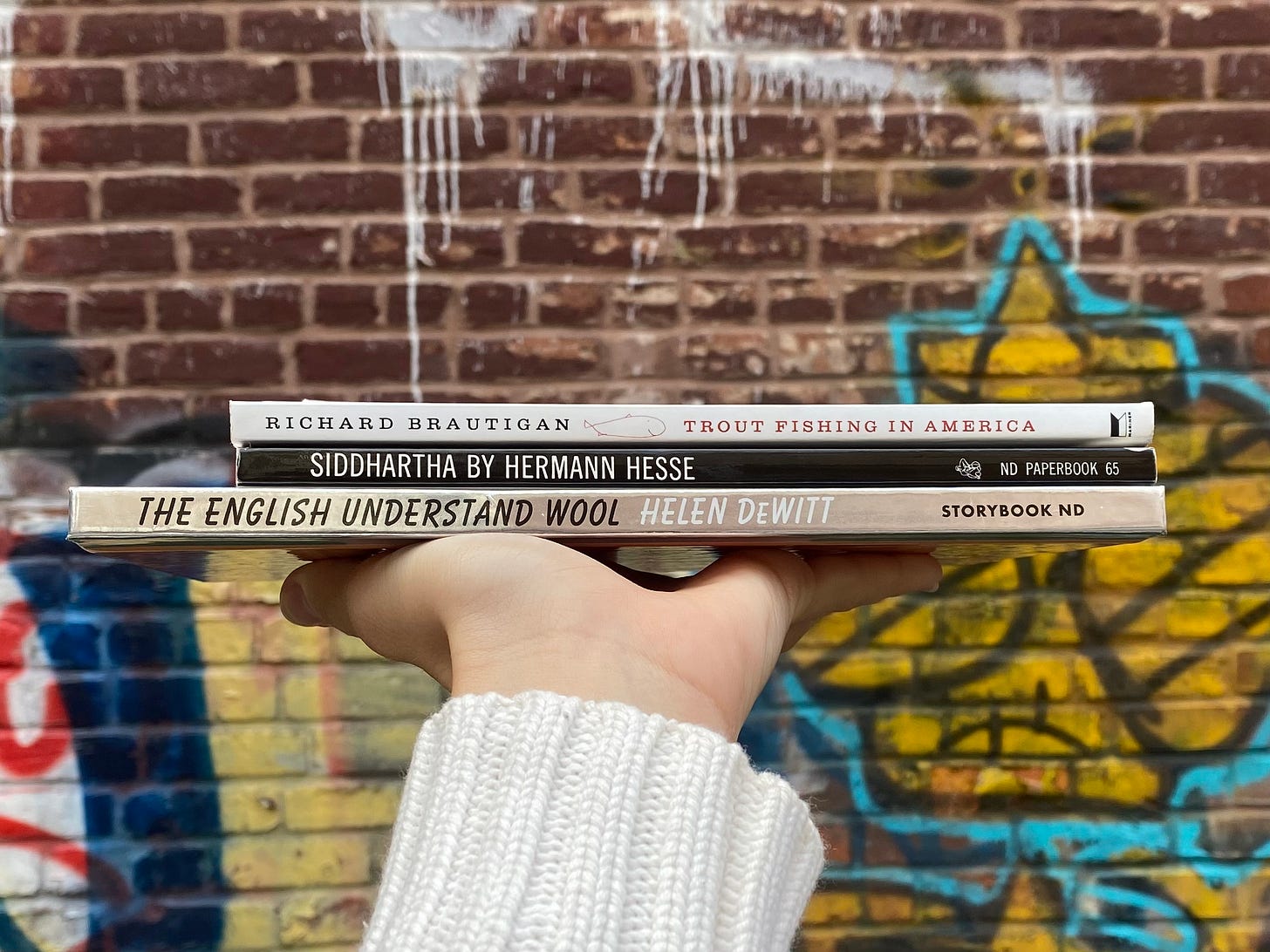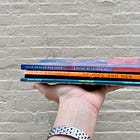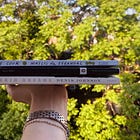Shorties pt. 4
Three short books for easy fall afternoon reading
Dear readers! Back again, with, yes! More short books for your reading pleasure on this lovely September Friday. It can’t be all Romola and Age of Innocence all the time. Sometimes even your girl needs something short that makes no sense, or something that’s short and full of wisdom or something that’s short and just fucking fantastic! That’s what I’m offering you today. Saved the best for last, so don’t skip out.
Also, it’s my mom’s birthday today. Happy Birthday, Mama <3
Trout Fishing in America by Richard Brautigan
112 pages
I barely understood a thing that happened in this book. Not that anything really even did happen. It’s not that type of book. Trout Fishing in America, in addition to being Brautigan’s title, serves within this text as a hotel, a character (more than one character in fact, at least I think), a dead body, a taunt, a salable item, an idea, a physical address, an idea and a literal act among other things.
I would describe this book as more of a series of loosely linked vignettes than anything else, taking place in San Francisco of the 1960’s, the Pacific Northwest of Brautigan’s childhood and a camping trip with wife and infant daughter. There is no linearity to it, no context, just trout fishing in America, if not in the foreground as a character or agent of action, then at the very least lurking in the background.
I learned from Billy Collins’s introduction in my edition, which was, by the way, my only real light in the dark, that Brautigan wrote most of the book while on the camping trip with his family that is featured throughout. Going back through my copy, I noticed that most of the admittedly few passages I underlined came from the camping trip chapters.
For me, these sections provided some version of a grounded reality, which was a relief. I enjoyed Brautigan’s descriptions of his surroundings—the hot springs, the creeks, the pools and fish and blackberries and quail. In these moments his writing becomes almost earnest, but not completely. There’s always a strange little metaphor or turn of phrase. The trees are “unrequited” or the creek flows “invited like a postcard to the ocean a thousand miles away.”
Because of the balance in these moments, though, I found it easier to enjoy Brautigan’s style—which I would describe as dry, wry, disappointed and humoring. Somewhat befuddled, but unconcerned with that beffudlement. Or maybe that’s just the state that I eventually learned to occupy while reading.
One other thing that Collins pointed out in his introduction that I was able to pick up on throughout was the way in which Brautigan portrays the clash between the American pastoral (trout fishing in America) and the ugliness of modernity. In one passage, Trout Fishing in America writes a letter home from New York City:
“I’m going to get out of New York. Tomorrow I’m leaving for Alaska. I’m going to find an ice-cold creek near the Arctic where that strange beautiful moss grows and spend a week with the grayling.”
This call back to nature, paired with the ever-present feeling of technological encroachment that Brautigan weaves throughout capture quite well a specific type of modern discontent, that I fear has only worsened since the 60’s. It was interesting and the writing was effective, but it’s not really my favorite vein to tap into.
Siddhartha by Hermann Hesse
122 pages
Siddhartha tells the story of a man (yes, Siddhartha) on the quest for enlightenment. He begins as a gifted young Brahman’s son—studious, gifted and magnetic. He soon feels that he’s learned all he can from the teachings of the priests and sets out into the forest with the Samanas, a group of ascetic monks. Then it’s off to meet the Buddha. Then, when he’s convinced that he cannot learn what he wants to learn from any teacher, he immerses himself in the material world.
This pattern repeats. Siddhartha is a seeker—almost to the point of being plagued by his search. And each time he moves onto his next ‘teacher’ he learns new lessons, he sees things more clearly, he lives happily for a time, but the seeker always rears his head again. Interestingly, it is in the moments that Siddhartha decides to move on—each time—that he experiences the most clarity. That his lessons solidify themselves. That his understanding grows.
This little novel is written in simple, almost biblical prose. Or mythical perhaps. It’s all very matter of fact, like a cross between a bedtime story and the story of all creation. Simple words, simple construction, but very powerful ideas, conveyed powerfully. I’ll try not to give too much away, because it’s so gratifying to travel along Siddhartha’s path as he travels it, but there were so many passages that had me nodding along! Phrased in just such a way that I felt they were things I had known all along and entirely new thoughts at the same time.
Like how “meaning and reality were not hidden somewhere behind things, they were in them, in all of them.” This call to be present in the physical world and to trust it. Or how the gift of ordinary people with ordinary lives is “the sense of importance with which they lived their lives, the depth of their pleasures and sorrows, the anxious but sweet happiness of their continual power to love.” The good and the bad together, the feeling of love. These things are worthy, and enviable.
But towards the end, I was snapped out of my satisfied trance. Towards the end, when conversing with an old friend, Siddhartha asserts that “Everything that is thought and expressed in words is one-sided, only half the truth; it all lacks totality, completeness, unity.” And I wanted to disagree! Hermann, I disagree!!!!!
But then I realized, of course, that I don’t really disagree. I know that it’s true. In fact, the insufficiency of language is a favorite conundrum of mine. It cannot suffice, it does not suffice. I wont argue that. But I can argue that Siddhartha (Hesse) leaves out something important. He leaves out the fact that the attempt is noble. And he leaves out the fact that in poetry, there can be and are flashes of totality, completeness and unity.
The English Understand Wool by Helen deWitt
69 pages
This book was SOOOOO good. You guys. You have to read it. Both of my sisters recommended this slim volume to me when I first embarked on my shorties journey, so thank you to Kathryn and Isabelle. I’m sorry I didn’t read it sooner. I cannot wait to read it again. Maybe this weekend.
This is the story of a 17-year old girl, raised by a pair of cultured, proper, stylish and aloof parents on a compound in Marrakech. As a result of this upbringing, she is cultured, proper, stylish and aloof, all at the young age of 17. It is not done—or in the book’s favorite turn of phrase, it’s “mauvais ton,” (bad taste), to make one’s servants work during the holy month of Ramadan, and so our narrator and her Maman spend the month abroad.
That is where our story opens, and we are introduced to the enigmatic world that these two women occupy, and the obvious (to them) rules that govern it. They go to the outer Hebrides for tweed because the best weavers are there, but to have the tweed made into suits there too? That would be insane. The suits must be made by London tailors. We learn all the things that Maman has taught our narrator. Aside from the English understanding wool,
The French understand wine, cheese, bread.
The Belgians understand chocolate.
The Italians understand coffee and ice cream.
The Germans understand precision, machines. (She in fact kept a Porsche in Paris.)
The Swiss understand discretion.
The Arabs understand honor, which embraces generosity and hospitality.
But though the glimpse into this particular upper class universe is engaging and amusing, that’s not all this story has to offer. It’s not long before we learn that during this particular Ramadan trip, Maman disappears without a trace from the London hotel. The police are on the scene. Something is seriously wrong. It’s a mystery! It’s a kidnapping! Wait who was kidnapped?
When a publishing house buys the rights to our narrator’s story, she recounts it. They want more however. They want a melodramatic, juicy, emotional peek behind the curtain. When she can’t and won’t provide what they’re looking for, the story develops into what I can only describe as a publishing heist. No car chases or anything, but intellectually speaking, heist-like. The resulting manuscript—with letters back and forth to her editor, and meta commentary on the whole process of writing it—is, in fact, what we end up reading.
I don’t want to give anything away because the way that DeWitt weaves this tale, and in the course of only 69 pages too (!!), is so spectacular. I can think of very few characters that are as captivating and delightful to read about as our cultured, proper, stylish, aloof—and I should also add gifted—17-year old narrator. This is the perfect example of what is possible with a short book. I would have read 500 pages more, but what a treat that it’s consumable in a couple of hours, satisfying and gratifying.
If you’re looking for more short books…
look no further. My other recommendations can be found here:
Aaaand, what a treat! Some short books from friends:











I LOVE LOVE LOVE “The English Understand Wool”. It’s a perfect book. PERFECT.
The English Understand Wool is a gem. I learned of it from Nigella Lawson, who posted about it on her Instagram. Reading your enthusiastic endorsement makes me want to reread it…again. I just bought Wool Gathering, by Patti Smith, another shortie with the word ‘wool’ in the title!